 Experts unanimously agree that there are benefits to pet ownership for children. In addition to teaching them responsibility, pets also entertain children, keep them active, alleviate stress and teach them about life. For some families, however, busy lifestyles make pet ownership impractical and even unrealistic. Enter another little known benefit of summer camp: summer pets. Many camp nature, exploration, and eco-science programs include an animal or two. Some camps even have extensive equestrian programs with camp-owned or leased horses and ponies. Because of allergies, camps tend to shy away from common household pets such as cats and dogs. Rather, animals with naturally reserved demeanors that are easy to handle like reptiles, rabbits, turtles and guinea pigs are preferable when it comes to camp pets. As a result, even campers who have pets at home get the opportunity to handle, care for and observe – to their comfort level – animals they may not frequently encounter. Those campers who do not have pets at home get to experience the joy of pet ownership and all of the benefits of it while those campers who do have pets at home tend to miss them less when their camp has animals. Camp pets sometimes double as mascots and campers come to view them as part of their camp. Best of all, everyone at summer camp, regardless of whether they have pets at home or not, has the opportunity to have a pet for at least a few weeks each year.
Experts unanimously agree that there are benefits to pet ownership for children. In addition to teaching them responsibility, pets also entertain children, keep them active, alleviate stress and teach them about life. For some families, however, busy lifestyles make pet ownership impractical and even unrealistic. Enter another little known benefit of summer camp: summer pets. Many camp nature, exploration, and eco-science programs include an animal or two. Some camps even have extensive equestrian programs with camp-owned or leased horses and ponies. Because of allergies, camps tend to shy away from common household pets such as cats and dogs. Rather, animals with naturally reserved demeanors that are easy to handle like reptiles, rabbits, turtles and guinea pigs are preferable when it comes to camp pets. As a result, even campers who have pets at home get the opportunity to handle, care for and observe – to their comfort level – animals they may not frequently encounter. Those campers who do not have pets at home get to experience the joy of pet ownership and all of the benefits of it while those campers who do have pets at home tend to miss them less when their camp has animals. Camp pets sometimes double as mascots and campers come to view them as part of their camp. Best of all, everyone at summer camp, regardless of whether they have pets at home or not, has the opportunity to have a pet for at least a few weeks each year.
Tag: sleepaway camps
The Other Camp Staff
 Summer camp employment is synonymous with “camp counselor” in most people’s minds. But, there are a lot of “non-counselor” positions at camp. If you’re interested in working at summer camp but don’t really think the role of camp counselor would be best for you, consider one of these alternatives:
Summer camp employment is synonymous with “camp counselor” in most people’s minds. But, there are a lot of “non-counselor” positions at camp. If you’re interested in working at summer camp but don’t really think the role of camp counselor would be best for you, consider one of these alternatives:
Program/Activity Head: Are you or have you ever been a professional or college level athlete or coach? If so, and you’re interested in working at summer camp, then the Program/Activity Head role might be a perfect fit for you. Program/Activity Heads oversee a sport or activity at camp. They typically have a staff of counselors who are also active in the sport or activity to assist with instruction and coaching. Program/Activity Heads plan daily activities, oversee instruction and assign campers to teams for intra and inter camp league play. There are also a handful of Program/Activity Head roles at camp for those who are not athletic but have some sort of niche expertise in areas like arts & crafts, music, dance, theater, cooking, science and communications.
Programming Staff: If you have a knack for scheduling, consider applying to work as part of a camp programming team. The  camp programming staff is responsible for the daily camper and staff schedules. When creating schedules, they must keep in mind things like facility availability, staffing ratios and camper frequencies.
camp programming staff is responsible for the daily camper and staff schedules. When creating schedules, they must keep in mind things like facility availability, staffing ratios and camper frequencies.
Special Events Staff: The special events staff at summer camp are responsible for all events that take place outside of the regular daily special. This is typically all evening activities and special days as well as (on that rare occasion) a rainy day. It helps if you have some sort of technical knowledge, such as connecting laptops to video screens, rigging microphones and operating (sometimes complicated) sound systems. But not everything you do as a special events staff member is hi-tech. You can also be charged with setting up a scavenger hunt, gathering and placing materials for game night, baking night or a host of other things. The imagination is the limit. If you love having fun, event planning and are detail oriented, special events might be the area of camp for you.
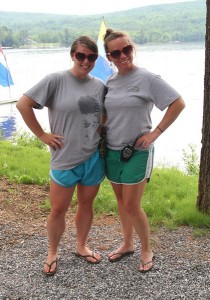 Photography/Videography: Camp photographer and videographer roles are highly specialized and extremely critical roles at camp. Every day, camp photographers take hundreds of photographs of daily activities and film many of the activities as well. If you’re a professional in either of these areas and are interested in working at summer camp, chances are there is a camp looking for you.
Photography/Videography: Camp photographer and videographer roles are highly specialized and extremely critical roles at camp. Every day, camp photographers take hundreds of photographs of daily activities and film many of the activities as well. If you’re a professional in either of these areas and are interested in working at summer camp, chances are there is a camp looking for you.
Camp Nurse: Summer camps maintain health centers and employ licensed nurses to dispense medication, clean up those inevitable scratches and cuts, and treat campers and staff who become ill during the summer. For those rare, more severe injuries that occur, nurses also may be asked to accompany campers or staff to local hospitals or doctors’ offices.
Office Staff: If you prefer behind the scenes desk work and answering phone calls, then consider applying for a camp office position. Typically, office staff answer phone calls, sort mail, greet visitors, manage camper phone calls, prepare documents or mailings, and complete other administrative tasks.
Maintenance Staff: If you’re a handyman (or woman) who’s good with a hammer, loves landscaping and cleaning, and prefers being outdoors to inside, consider applying to work as a member of the maintenance team. Camp maintenance staff stay busy all summer long maintaining summer camp campuses, and no two days as a camp maintenance staff member are alike.
Kitchen Staff: Working in the camp kitchen is perfect for those who thrive in restaurant environments. If you’re a chef, caterer  or member of a restaurant staff- or aspire to be one – then working in a summer camp kitchen is a fun alternative to restaurant work.
or member of a restaurant staff- or aspire to be one – then working in a summer camp kitchen is a fun alternative to restaurant work.
If any of these camp roles interest you, camps are hiring now. Many of the people who work in these roles return year after year because they are a great way to integrate personal interests and specialized expertise with the fun and adventure of working at summer camp. Apply now and you just may find yourself returning year after year too.
Popular Sports at Camp
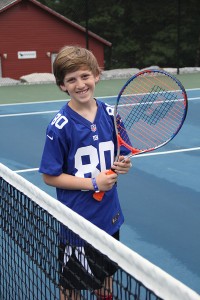 There is a decided difference between popular school sports and popular camp sports. Most schools throughout the nation focus on key sports like football, baseball, softball, basketball, volleyball, and soccer. At summer camps, campers have much more exposure to non-traditional sports that receive decidedly less promotion through school but prove rather popular at camp, in spite of—or perhaps because of —the fact that they are not widely promoted in school environments.
There is a decided difference between popular school sports and popular camp sports. Most schools throughout the nation focus on key sports like football, baseball, softball, basketball, volleyball, and soccer. At summer camps, campers have much more exposure to non-traditional sports that receive decidedly less promotion through school but prove rather popular at camp, in spite of—or perhaps because of —the fact that they are not widely promoted in school environments.
Tennis is a sport to which most children are exposed for only a few weeks of physical education class each year. At camp, however, it’s one of the most popular and beloved activities. Campers have the opportunity to play several hours of tennis each week on quality courts and even participate in intra and inter camp league play. Furthermore, the instruction is excellent. Many summer camp tennis directors are former tennis pros who have played at the elite level in premiere tennis competitions.
Lacrosse, although popular in New England and other pockets of the Eastern United States, is not widely played in many regions of the country. Yet, it’s one of the most popular camp sports. Many summer camps offer extensive and ever growing (by popular demand) lacrosse programs. Most camp lacrosse specialists play at the college level and many lacrosse heads coach at the college level. Campers who hail from geographic regions in which lacrosse is still an underdog sport have the opportunity to receive valuable, quality instruction that surpasses anything available where they live. In fact, many of these campers play lacrosse for the first time while at summer camp and discover a new favorite sport.
For children who love water, boating is another popular camp activity to which most campers receive little to no exposure during the  school year. Camp waterfronts are a crucial part of camps, and campers spend a lot of time in or on the water at camp. To sweeten the pot, summer camps make various types of boats available so that campers can try their hand at canoeing, kayaking, sailing, and even stand-up paddle boarding. Waterskiing is another popular water sport on which many camps place a particular focus. Campers have the opportunity to waterski throughout the summer, and some of the most enthusiastic camper responses every summer are those of campers who get up on water skis for the first time.
school year. Camp waterfronts are a crucial part of camps, and campers spend a lot of time in or on the water at camp. To sweeten the pot, summer camps make various types of boats available so that campers can try their hand at canoeing, kayaking, sailing, and even stand-up paddle boarding. Waterskiing is another popular water sport on which many camps place a particular focus. Campers have the opportunity to waterski throughout the summer, and some of the most enthusiastic camper responses every summer are those of campers who get up on water skis for the first time.
Animal loving campers adore camp equestrian programs. Campers who live in urban environments and have minimal exposure to animals throughout most of the year enjoy learning to care for and ride horses. The experience is doubly beneficial when the fact that equestrian programs are virtually non-existent at the majority of schools is taken into consideration.
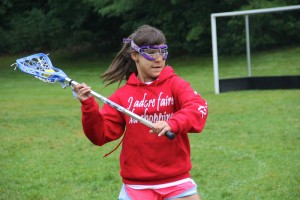 Campers race to suit up for roller hockey. It’s an action packed and fast paced sport that is fun to play and a key activity in many camp programs. Not only do a lot of campers embrace an otherwise unfamiliar sport in roller hockey, they learn how to skate as well!
Campers race to suit up for roller hockey. It’s an action packed and fast paced sport that is fun to play and a key activity in many camp programs. Not only do a lot of campers embrace an otherwise unfamiliar sport in roller hockey, they learn how to skate as well!
Archery. Most schools don’t offer archery, even as part of a physical education program. But it’s a regular part of camp, and pretty much every camper who takes aim at the bulls-eye throughout the summer will tell you that it’s a fun one.
Golf. Yep, many camps offer golf instruction as well. Campers love to relax while driving balls and working on their strokes. They also like that golf is a sport in which it is relatively easy to measure one’s level of improvement throughout the summer.
Gaga is practically synonymous with camp. It’s serious business there, and it can get intense. Gaga is practically unheard of outside of the camp realm. Still, ask virtually any summer camper to list their top five favorite activities at camp, and chances are that gaga will appear somewhere on that list.
Many a camper engages in what will become a favorite sport at camp for the first time. Perhaps it’s because some sports are a rare treat 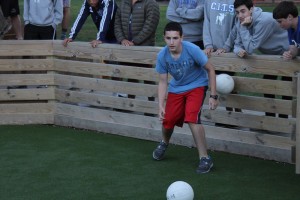 that, if it wasn’t for sleepaway camp, campers know they would never get to experience and, therefore, are eager to embrace. It can also be that campers find the newness of such sports refreshing in respect to the typical repertoire of school sports. Either way, summer camp is an excellent way for campers to receive exposure to and quality instruction in sports that may not be so popular at school but prove very popular at camp.
that, if it wasn’t for sleepaway camp, campers know they would never get to experience and, therefore, are eager to embrace. It can also be that campers find the newness of such sports refreshing in respect to the typical repertoire of school sports. Either way, summer camp is an excellent way for campers to receive exposure to and quality instruction in sports that may not be so popular at school but prove very popular at camp.
Summer Camp Helps Children Maintain Routine
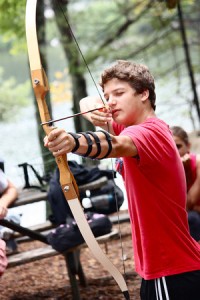 Summer camp is a lot of fun. One need only ask any camper on virtually any summer camp campus to confirm that notion. Children love the activities and the relatively relaxed environment of sleepaway camp. However, there is something else that summer camp children crave, although they might not know it: structure. Dr. Laura Markham asserts that routine helps children develop self-discipline, cooperation, change tolerance, and responsibility.
Summer camp is a lot of fun. One need only ask any camper on virtually any summer camp campus to confirm that notion. Children love the activities and the relatively relaxed environment of sleepaway camp. However, there is something else that summer camp children crave, although they might not know it: structure. Dr. Laura Markham asserts that routine helps children develop self-discipline, cooperation, change tolerance, and responsibility.
To an outsider, summer camps may seem like little more than organized chaos. However, most summer 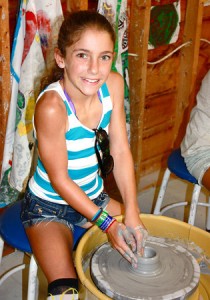 camps operate around set daily schedules that move children from activity to activity at specific times throughout the day. Although the daily activities may change, the times and length of the periods do not. Meals are also held at set times. The use of bugle calls, bells, music, or announcements assist campers in transitioning from one part of their day to another, which, according to Markham, helps eliminate power struggles by setting parameters and giving children a recognizable sign for knowing when it’s time to bring one activity to a close and move onto another without being told.
camps operate around set daily schedules that move children from activity to activity at specific times throughout the day. Although the daily activities may change, the times and length of the periods do not. Meals are also held at set times. The use of bugle calls, bells, music, or announcements assist campers in transitioning from one part of their day to another, which, according to Markham, helps eliminate power struggles by setting parameters and giving children a recognizable sign for knowing when it’s time to bring one activity to a close and move onto another without being told.
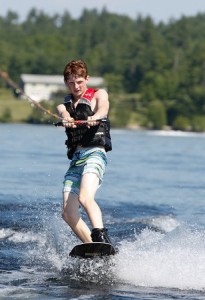 A daily routine also helps at night. Research shows that children who have a structured schedule sleep better at night. Routine also lessens anxiety and improves behavioral issues. Children feel less anxiety when they understand what is expected of them and can confidently anticipate what will happen next. Summer camp is built on traditions that happen from year-to-year. Many camps are also divided into age groups that serve as steps through the camp experience from the first year of camp to the final. From their first day at camp, there are certain rites and privileges related to sleepaway camp traditions specific to each age group to which campers can look forward as they get older. That children can see from the beginning that summer camp is a progressive process also helps them to understand the concept of patience when working toward a goal.
A daily routine also helps at night. Research shows that children who have a structured schedule sleep better at night. Routine also lessens anxiety and improves behavioral issues. Children feel less anxiety when they understand what is expected of them and can confidently anticipate what will happen next. Summer camp is built on traditions that happen from year-to-year. Many camps are also divided into age groups that serve as steps through the camp experience from the first year of camp to the final. From their first day at camp, there are certain rites and privileges related to sleepaway camp traditions specific to each age group to which campers can look forward as they get older. That children can see from the beginning that summer camp is a progressive process also helps them to understand the concept of patience when working toward a goal.
Because of the benefits provided by the structure of summer camp, many parents are increasingly seeing 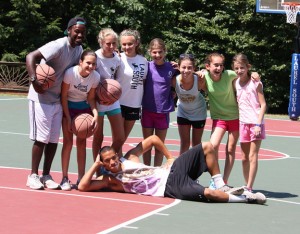 the advantages of time spent at summer camp. As a result, summer camp is experiencing a revival of sorts as a summer staple. More than eleven million people attended camp last year, according to the American Camp Association. If you’re trying to think of a way to add value to your children’s summer, consider sending them to summer camp.
the advantages of time spent at summer camp. As a result, summer camp is experiencing a revival of sorts as a summer staple. More than eleven million people attended camp last year, according to the American Camp Association. If you’re trying to think of a way to add value to your children’s summer, consider sending them to summer camp.

